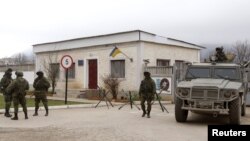KYIV —
Mykola Malmuzh, former head of Ukraine’s external intelligence service, says security chiefs feared Russia would eventually try to seize Crimea and urged the country’s then president, Leonid Kuchma, to demand an enforcement mechanism for the 1994 Budapest Memorandum before signing it.
Malmuzh says intelligence chiefs worried that the agreement signed by the U.S., Russia, Britain and Ukraine failed to provide legally binding assurances.
The Western powers and Ukraine say Russia has broken the agreement by invading Crimea. The Budapest Memorandum committed all parties “to refrain from the threat or use of force against Ukraine’s territorial integrity.” But the agreement is not a treaty and doesn’t require any of the signatories to do anything in the event of violations.
Malmuzh, an army general who is advising Ukraine’s interim government, says he and other Ukrainian security and military chiefs have been talking behind the scenes with their Russian counterparts since Russia seized Crimea to try to find a way to resolve the crisis.
And he says Ukrainian forces are being moved to the east of the country to deter any further aggression from Russia. Ukrainian forces will continue to show restraint and only fight if there are further Russian encroachments into Ukraine, or if the lives of soldiers are threatened.
But the slow deployment of Ukrainian forces has earned the reproof of the leaders of the Maidan uprising. One of them, Sergey Poyarkov, says the interim government has been too slow in response to Russia’s land grab of Crimea.
“It seems like they behave very passively to the situation," he said. "We don’t understand why they are not really doing anything decisive.”
While not calling for a firefight, Poyarkov and other leaders of the uprising that ousted President Viktor Yanukovych last month believe Ukraine's interim government could block the approach to the Crimea and even part of Crimea with its own army.
"We could see like a line of defense about half of Crimea," said Poyarkov.
With a referendum on Crimea’s future just days away, tension is mounting.
Malmuzh says intelligence chiefs worried that the agreement signed by the U.S., Russia, Britain and Ukraine failed to provide legally binding assurances.
The Western powers and Ukraine say Russia has broken the agreement by invading Crimea. The Budapest Memorandum committed all parties “to refrain from the threat or use of force against Ukraine’s territorial integrity.” But the agreement is not a treaty and doesn’t require any of the signatories to do anything in the event of violations.
Malmuzh, an army general who is advising Ukraine’s interim government, says he and other Ukrainian security and military chiefs have been talking behind the scenes with their Russian counterparts since Russia seized Crimea to try to find a way to resolve the crisis.
And he says Ukrainian forces are being moved to the east of the country to deter any further aggression from Russia. Ukrainian forces will continue to show restraint and only fight if there are further Russian encroachments into Ukraine, or if the lives of soldiers are threatened.
But the slow deployment of Ukrainian forces has earned the reproof of the leaders of the Maidan uprising. One of them, Sergey Poyarkov, says the interim government has been too slow in response to Russia’s land grab of Crimea.
“It seems like they behave very passively to the situation," he said. "We don’t understand why they are not really doing anything decisive.”
While not calling for a firefight, Poyarkov and other leaders of the uprising that ousted President Viktor Yanukovych last month believe Ukraine's interim government could block the approach to the Crimea and even part of Crimea with its own army.
"We could see like a line of defense about half of Crimea," said Poyarkov.
With a referendum on Crimea’s future just days away, tension is mounting.




